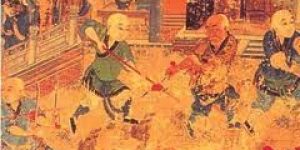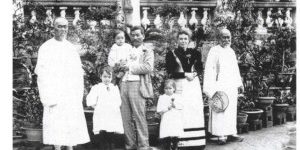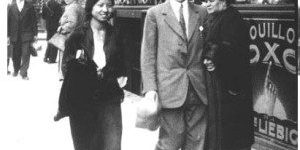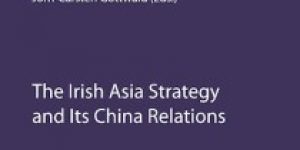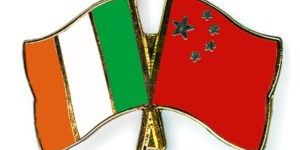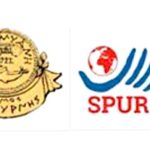Chapter 6: Irish-Chinese Political and Economic Relations – An Overview ~ The Irish Asia Strategy and Its China Relations
No comments yet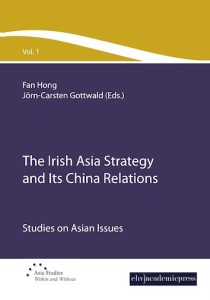 This chapter provides a summary background to current relations between the Republic of Ireland [Ireland] and the People’s Republic of China [PRC]. Subsequent chapters will deal with certain issues in greater depth but it is useful here to provide a quick tour through the development of Sino-Irish bilateral relations. The leading theme behind this overview is to highlight the more important principles behind current bilateral relations and the resources needed to develop these relations in a positive manner to the benefit of both nations. The first section will deal with contacts before the founding of the PRC and Ireland to offer a flavour of early historical connections between the two lands. Then in chronological order selected developments are described bringing us to present day government policy.
This chapter provides a summary background to current relations between the Republic of Ireland [Ireland] and the People’s Republic of China [PRC]. Subsequent chapters will deal with certain issues in greater depth but it is useful here to provide a quick tour through the development of Sino-Irish bilateral relations. The leading theme behind this overview is to highlight the more important principles behind current bilateral relations and the resources needed to develop these relations in a positive manner to the benefit of both nations. The first section will deal with contacts before the founding of the PRC and Ireland to offer a flavour of early historical connections between the two lands. Then in chronological order selected developments are described bringing us to present day government policy.
6.1 Pre-1949 Relations
Historically there has been little in the way of ‘national’ relations between Ireland and China due to terms of geographic distance and the resources and political realities of Ireland before the declaration of the Irish Republic. However there have been some notable individuals from Ireland involved with China. George Macartney [1737–1806] acted as Ambassador for the first British mission in 1793 to open up trade between the British and Chinese empires. From County Antrim of Scottish descent, Macartney has been widely though perhaps incorrectly blamed for failing to open trade with China by refusing to kowtow[i] to the Qianlong (乾隆) Emperor. Sir G.W. Staunton [1781 – 1859] served as ‘page to the Ambassador’ accompanying his father a Galway man to China, both serving under the Macartney mission. The younger Staunton, having studied Chinese, is said to have been the only member of the British Embassy able to converse in Chinese and read Chinese characters. Staunton was one of the original founders together with H.T. Colebrook and others of the Royal Asiatic Society. Trade did flourish after more successful missions with items such as tea, china, and fabric making it to Ireland.
The extensive Asian cultural treasures at the Chester Beatty Library in Dublin were gifted to the Irish people by Chester Beatty [1875 – 1968] an American who was made the first honorary Irishman in 1957. From his childhood, Beatty developed a fascination with artefacts from the orient and Beatty collected many works and items of interest from Asian cultures including Chinese artefacts that are now on display at the library.
Ireland, from her struggle towards independence had some recognition in China amongst its revolutionaries and activists, especially for an Eamon de Valera speech at the League of Nations in 1932 admonishing Japan’s incursions on Chinese sovereignty. Mao Zedong is said to have once held celebrations in Ruijin[ii] on the 7th November 1931 to mark the founding of the Chinese Soviet Republic[iii] (中华苏维埃共和国) at which
“there were drums and firecrackers and skits, one with a ‘British imperialist’ driving before him prisoners in chains labelled ‘India’ and ‘Ireland’”[iv].
During this period, social upheaval (with the Communists, the warlords, and the Kuomintang, each trying to preserve and gain power) saw danger for missionaries, many of whom were Irish. One such priest was the Very Reverend Fr. Cornelius Tierney of Co. Monaghan, who went to China as part of the Maynooth mission serving in Kien Chang district of Jianxi Province. Reports in the Irish papers of the time relay how when he rang the bells for mass on a morning in November 1930 ‘Chinese Communist Bandits’ who had entered the village, headed to the church and took Fr. Tierney hostage demanding a ransom of 10,000 Mexican dollars[v] for his return. The group charging the ransom were held to be the same group who had killed another Irish priest Rev. Timothy Leonard from Limerick, the previous year. Fr. Tierney was to die on or around March 5th 1931 from illness despite diplomatic attempts by the British Legation in China.
Possibly the first high level contact in official capacity by an Irish politician was Eamon de Valera’s meeting with Zou Taofen[vi] [1895 – 1944] on December 4th 1933. At the meeting Zou praised the Irish Independence movement whilst de Valera impressed upon him the need for the Chinese to maintain tight organisation and strive for a social revolution.[vii] One other early Irish connection with China is the early Chinese nuclear program. This project was led by Peng Huan Wu, (彭桓武), [1915 – 2007] who in 1941 had attended the Dublin Institute of Advance Studies founded one year earlier by de Valera.
6.2 Post-1949 Relations
6.2.1 United Nation’s Seat For the People’s Republic of China
In 1949, de Valera oversaw the formal establishment of Ireland as a Republic. The same year saw Mao Zedong declare the foundation of the Peoples’ Republic of China [PRC] on October 1st. With the League of Nations dismissed after World War Two and its responsibilities handed over to the United Nations [UN] under guidance of Irishman Séan Lester as its final Secretary General, Ireland had to wait to until 1955 to join due to Soviet Union veto. When Ireland finally became a member of the UN the Republic of China [RoC] was already a member as one of the founding nations. Thus Ireland recognised the government of the RoC as sole legitimate representative of the Chinese people at the United Nations to the exclusion of the PRC. The PRC government however sought to gain a seat at the United Nations which led to many tense negotiations amongst members of the UN. The United States led the Western block in trying to keep the PRC excluded.
Three principles established by Liam Cosgrave[viii] for Irish foreign policy during this period argued for acting in the preservation of Christian civilisation, observing the charters of the United Nations and maintaining independence and sovereignty in foreign policy decisions. The latter implies that foreign policy decisions are made apart and aside from other influences outside of the other two principles. This resulted in the Irish government taking an independent line from the USA led Western bloc at the UN to take a position in favour of discussion of admitting the PRC to the UN. That Ireland would vote in such a manner as a Catholic, non-communist, non Afro-Asian country led to disbelief of those nations who felt they were guaranteed support from smaller newer member-nations like Ireland. From Dáil debates going back to the 1960s, it can be seen that the Irish government was concerned about the communist government of the PRC internationally dominating the favoured democratic government of the RoC, but reasoned that in such bodies as the United Nations it was necessary to ensure the participation of those nations
‘of whose policies we strongly disapprove and the philosophy of whose rulers is abhorrent to our people… if the United Nations is to become what we would like it to be, namely, an effective shield for world peace, then clearly it must comprise countries of that character’.[ix]
The governments’ decision to eventually recognise the Communist government in Beijing was further reasoned along the following lines: both Chinese governments claimed to be the one true government and claimed equal territories, to ignore the larger mainland government meant disallowing de facto representation of approximately 500 million individuals at the U.N. in favour of 12 million individuals represented by the RoC.[x] In addition, the emergence of the PRC as a nuclear power during the 1960s was cause to argue for the communist government’s inclusion for both the benefits and the necessity of having a nuclear power as a member of the world body mandated to build peace.
The People’s Republic of China was eventually admitted to the U.N., on October 25th 1971, when the rising number of independent African states was such that it became much harder for the U.S. to maintain the Western-dominated majority to continue refusing admission. The U.S. therefore decided to change their position to one of in favour and subsequently the RoC was no longer attendant at the UN in representation of China. Ireland’s independent foreign policy stance at the UN resulted in the Irish vote being actively sought after as opposed to a passively accepted one. It also led to Ireland being grouped with so-called ‘fire-brigade’ nations that served to rally consensus in difficult negotiations at the UN.[xi]
6.2.2 Diplomatic Relations With The PRC
Ireland voted in favour of PRC membership of the U.N. supplanting the People’s Republic of China in 1971 but still did not open diplomatic bilateral relations with the PRC. It was not until after Ireland’s membership of the European Economic Community [EEC] was formalised in 1973, that Dublin established diplomatic relations with the Beijing government in 1979. The EEC had established diplomatic relations with Beijing four years earlier. Ireland and China then exchanged ambassadors in 1980. The One China policy[xii] Ireland has adopted prevents official political relations with Taiwan; however this is not to say that Ireland does not have good relations with the Taiwanese under economic, educational, and cultural headings.
The issue of Taiwan surfaces occasionally between Oireachtas members despite the government continually reaffirming its adherence to the One-China principle. On the 8th of February 2008, asked if he would make a statement on his departments’ non-recognition of Taiwan the Minister for Foreign Affairs Dermot Ahern replied that in common with the majority of UN members Ireland recognises the People’s Republic of China as the sole legitimate government of China and that Taiwan’s official status is as a Province of China, but equally stresses the importance of harmonious cross-China straits relationships between Taiwan and China. The Minister concluded his statement by saying;
‘The economic relationship and interdependence between the China and Taiwan is expected to expand and deepen in the coming years… It is to be hoped that these economic relationships will help ease political tensions across the China Straits in the longer-term.’[xiii]
This is an example of Ireland aligning with EU policy in the formation of its own foreign policy, hoping that increased trade and interdependence will facilitate the peaceable solution of the tensions between China and Taiwan.
6.3 Contemporary Relations
The meteoric rise of China as an economic power has been nothing short of remarkable considering the historical backdrop and political culture of the Chinese authorities. As China’s economy gains momentum we have witnessed a tremendous growth in the presence and importance of China not just in global affairs but in European and Irish affairs. Ireland as a trade-dependent nation expresses economic concerns where possible, and when necessary, in it’s foreign policy. Globalisation and bilateral trade did not inevitably lead to the evident cordial political relations. As noted in A Strategy for Long-Term Development of Foreign Earnings in Asia, certainly one of the motivating factors for the many visits of Irish politicians to China concerns the business culture in Asia;
“In Asia, where hospitality and prestige indicate power, political visits and diplomatic activity have perhaps even more significance from a foreign earnings perspective than elsewhere. This factor needs to be built into the strategy in a systematic way at headquarters level as well as in the field. For example, visits to these markets and reciprocal programmes of well planned hospitality around core foreign earnings interests will have a key role. Ministerial time for these purposes should be given priority, notwithstanding the fact that the results of the investment of Cabinet time may not be obvious in the medium term.”[xiv]
The impacts of Ireland’s relationship with China have been varied. On the one hand there is increased awareness of China as an economic power- wherein lies great possibilities for the adventurous entrepreneur- evident in the large trade missions that accompanied high level political visits to China in recent years. It is important that the Irish government develops the manpower, structures and the resources necessary for sustained engagement in developing the Chinese and all Asian markets as the Asia strategy sets out to do. One central aspect to developing new resources upon which to draw is education.
Below are brief sections introducing the most important areas of the Irish governments’ relations with China. These sections are discussed in more depth in later chapters.
6.3.1 Economy
The efforts on the part of Irish politicians and bureaucrats endeavouring to ensure that potential benefits are maximised has seen bilateral visits, trade missions, increased diplomatic presence in China and the establishment of the Asia Strategy identifying China as a priority market. Former Taoiseach Bertie Ahern noted after his visit to China in 2005 that:
“France, Britain and Germany are fighting for …Chinese foreign investment in a hugely competitive market … whereas [in comparison to Irish efforts] President Chirac and Gerhardt Schroeder, in particular, seem to visit with huge delegations almost annually. Other countries are ahead in terms of attracting investment in a significant manner through building up extensive relationships. However, there are also opportunities for Ireland.”[xv]
The Asia Strategy was formulated against this competitive environment in order to increase expertise on Asian markets and to foster greater economic and political relations with identified Asian countries. This strategy is overseen by a High Level Group whose members represent the chief private and public sector bodies concerned with Enterprise, Trade and Foreign Relations. The core objective of the Asia Strategy is stated as follows:
‘…to develop relationships between Government, business organisations and Irish and Asian peoples generally. This is in support of the central focus on increasing trade with that continent, creating wealth in Irish companies, particularly in smaller companies and contributing to national prosperity, employment creation and maintenance.’[xvi]
Within this policy, China is identified as a priority market. The Irish-China policy therefore endeavours to build on existing trade and business within the Chinese market.
6.3.2 Human Rights
Ireland has a strong impetus on human rights in its foreign policy with issues of human rights abuses in China regularly a parliamentary topic in the Oireachtas. Ireland habitually draws attention to human rights concerns at high-level meetings with Chinese officials at national and supra-national levels. Some recent examples included the meeting of the Irish Minister for Foreign Affairs Dermot Ahern with Chinese Foreign Minister Li Zhaoxing on 12 May 2006, in Beijing; Tánaiste Mary Harney on 25th September 2006 with Chinese Vice-Premier Zeng Peiyan in Dublin; Avril Doyle MEP, member of the Delegation for Relations with the People’s Republic of China at the 24th EP/NPC Inter-parliamentary- Meeting from 23 June 2007 to Friday 30 June 2007 in Beijing and Tibet. A case in point is the successful involvement of the Irish government in the return of Mr. Zhao Ming and Mr. Liu Feng to Ireland after their detention in labour camps in China due their participation with the Falun Gong movement through the EU-China Humans Rights dialogue. Former Taoiseach Bertie Ahern noted:
‘…while the Chinese authorities do not like talking about human rights in the public domain or at press conferences, …, privately they have no difficulty in doing so and accept the point that they must make huge progress. They accept that they are doing so under the EU-China human rights dialogue, of which there have been 17 rounds. They are engaging with the issues. I met the Chairman of the People’s Congress …, he made it clear that they are anxious to engage at parliamentary level on these issues. They are making strides forward. Nonetheless, the Chinese authorities make the point that theirs is a country of 1.3 billion people, who are part of a very different culture and tradition that includes many aspects which are totally unacceptable to people in Europe. However, the best way forward is to engage with them.’ [xvii]
There certainly is an issue of realpolitik in the extent to which small nations like Ireland might be able to exact change within Chinese borders. Chinese authorities are reluctant to welcome interference in internal domestic affairs and conversely are more uninhibited in their dealings with nations that have questionable attributes, for example, offering aid to Zimbabwe without ties to political transparency or human rights. But there is an argument that Irish-Chinese dialogue will offer better opportunities to lead and persuade in areas such as transparency, governance and human rights within the abilities of Ireland’s influence, rather than intentionally distancing herself from China altogether. Such a policy of non-contact would also put Ireland at odds with the E.U. at large when efforts are being made for a more cohesive E.U. foreign policy towards China. Irish concerns can arguably be more effectively brought to the table under the banner of the European Union.
6.3.3 European Union
The European Union inevitably plays an important role in the development of Irish relations with China; to what extent the Irish government independently follows its own course in relation to China depends on the issues at stake. There is increasing evidence that member nations of the EU are, when desirable, leaving prickly issues such as human rights out of their national foreign policies in their dealings with China and deferring to EU institutions to tackle such issues on their behalf. This is not necessarily a case of not wanting to damage trade relations by offensive accusations but rather the EU is a better forum for dealing with such sensitive issues. As alluded to earlier, increased pressure can be brought to bear on China in terms of EU-China bilateral relations.
China has in fact been part architect of this emerging strategy: on previous occasions, China has warned individual EU states of ‘consequences’ if certain actions were to be followed through i.e. sales of arms to Taiwan, censorship at the UN over human rights. In the case of human rights one can look at the failure of the UN General Assembly motion to condemn China’s human rights record in 1997 tabled by Denmark and supported by Ireland. Without the backing of other European countries both Ireland and Denmark risked retaliation from a resentful China. The failure of the motion was a coup for Chinese authorities and their influence in Europe at national and international levels. The EU stands to gain more ground as a cohesive unit rather than as a medley of nation states that can be in turn be coerced into competing or disagreeing with each other. At a symposium held in UCC regarding Ireland and the European Union in 2007, former President of the European Parliament Mr. Pat Cox mused that for nations of a continent that had developed and used the strategy of divide and conquer to great effect- to succumb to such a strategy in the challenges of today’s world would be to our detriment. It is not so much a question of the independence of Irish foreign policy in relation to the European Union, rather a question of how best to utilise the existing interdependence of Irish foreign affairs with our European partners in engaging with China. It may make political, economic and even moral sense to leave certain matters for the EU to deal with collectively on the one hand, whilst concentrating individually on furthering bilateral relations on the other.
6.3.4 Education Sector
The development of Irish educational services in the international market is the best strategy through which to strengthen medium to long-term bilateral relations in both the political and economic arenas with China as well as other Asian countries. (This was acknowledged by Taoiseach Bertie Ahern in his speech at Tsinghua University in Beijing in January 2005). It serves to develop links and networks at a social and cultural level whilst strengthening ties in commercial, technological and research fields. Chinese students in Ireland have linguistic ability, an understanding of the Chinese market, in depth knowledge of Chinese social and cultural structures and they can facilitate a network of contacts (important in China where this is known as “Guanxi”). The provision of Irish cultural and linguistic specialists through the Irish education system will be beneficial to ensure that relations develop to their full potential. On 23 February 2006, The Agreement on Mutual Recognition of Higher Education Qualifications between the Government of Ireland and the Government of The People’s Republic of China, was signed by the respective Ministers for Education. This agreement came into effect from May 2006 and will greatly enhance the mobility of academics and scientists leading to greater potential in innovation and research. It will also create employment opportunities in China for those whom are Irish-educated whether they are Chinese, Irish or other nationalities and of course help Chinese educated students enter employment here in Ireland. This agreement is a natural development on the course for internationalising the education services of Ireland. It is important that when Chinese students come to Ireland to gain third-level qualifications, these qualifications are then recognised when they return to China.
These positive steps have been taken for two reasons – on the one hand their goals are to further enhance bilateral relations between Ireland and China. On the other it is part of the Irish strategy to be, by 2013, a nation
‘internationally renowned for the excellence of its research, and … [be at] the forefront in generating and using new knowledge for economic and social progress, within an innovation driven culture’.[xviii]
As for this latter aim, the agreement mirrors other similar arrangements between Ireland and the US/Ireland and India, and Ireland and other E.U. countries. As the government paper cited above examples: the average spend by an E.U. 25 country on research and development is some bit above € 7 billion which is comparable with many multinational companies, thus if individual nations wish to develop at a sufficient rate, trans-national cooperation is a sensible and necessary method of doing so in order to gain needed funds, expertise, training and technologies. China is a worthwhile partner for this endeavour, in striving to attain higher standards in research and development in the areas of science and technology, China has economy of scale on its side and shares areas of interest with Ireland. Ireland has expertise and training to offer in vital areas such as information, communications technology and biotechnology. The predicted shortfall in labour for the science and technology fields in Ireland could be an enticement for Chinese students whom are Irish-educated graduates to stay in Ireland to work and develop their expertise. Strengthening educational links especially with regards to marketing subjects with expected skills shortages such as information and communications technology can help Ireland hold the pace needed at international competitive levels. Science and Technology are already two of the biggest areas in which study is undertaken by Chinese students.
Under the auspices of the Asia Strategy, the Irish Institute of Chinese Studies [IICS] was set up at University College Dublin and University College Cork [UCC], providing language, business and culture training to Irish students at both under and post graduate level. The IICS is rapidly growing from strength to strength sending UCC students for prolonged periods of study at partner universities in China. The IICS also successfully initiating an annual international conference on China with the inaugural conference taking place in March 2007 in Cork at UCC.
6.4 Remarks
The summary nature of this chapter has prevented detailed discussion of some major topics, however these topics such as economics and human rights are dealt with in later chapters granting them the attention and space they deserve. The purpose here is to provide the reader an introductory overview on some of the aspects of Ireland’s bilateral relations with China. The key points to take from the discussion presented thus far are the central importance of continued attention and visits by Irish officials to China due to the political and business culture of the Chinese. Further, the dual responsibility of the education sector in attracting Chinese students to Ireland and providing training for Irish students to adequately serve the needs of developing relations at national and European levels with China. And thirdly to recognise the benefits of EU membership on the international stage that provide smaller nations like Ireland a stronger voice. As a trade dependent nation it is important that Ireland secures future markets while concurrently maintaining our tradition of supporting human rights and freedom of expression at national level in our foreign policy.
NOTES
[i] Kowtow was a traditional act of respect shown to the Chinese emperor by kneeling and bowing so as to touch the ground with one’s head.
[ii] Jianxi province in south-eastern China.
[iii] Alternatively know as the Jiangxi Soviet 1931 – 1934
[iv] Chang, J., and J. Halliday. 2005. Mao: The Unknown Story. London: Vintage. Pg.125.
v. Some sources indicate 40,000 Mexican dollars.
[vi] Editor and publisher based in Shanghai, then Nanking also known as Zou Taofen, born Zou Enrun May 4th.
[vii] Ch’en, J., China and the West London: Hutchinson & Co. 1979 Pg. 88.
[viii] Cosgrave served as Minister for External Affairs from 1954 to 1957, overseeing Irish admission to the UN.
[ix] Dáil Éireann, ‘Government of China’, Questions, Oral Answers: Remarks by then Taoiseach answering on behalf of Minister for External Affairs, Volume 187, pp. 862-863, 21 March, 1961.
[x] Dáil Éireann, ‘UNO: Membership of Communist China’, Questions, Oral Answers, Volume 213, 15 December, 1964.
[xi] Cruise O’Brien, C. 1962. To Katanga and Back: A UN Case History. London: Hutchinson & Co. Ltd. Pg.26ff.
[xii] The One-China principle refers to official recognition of only one Chinese government as sole legitimate representatives of China.
[xiii] Parliamentary Question 71, Ref No: 3911/07, 8 February 2007. available at
http://193.178.1.238/Debate.aspx?F=DAL20070208.xml&Node=H7#H7 Last viewed 24 August 2007.
[xiv] ‘A Strategy for Long-Term Development of Foreign Earnings in Asia’, Department of Enterprise, Trade and Employment; Government Publications, Pg. 24: Oct. 1999.
[xv] Parliamentary Debates, Leaders Questions, Pg 1357 2 Feb 2007 Available at
http://debates.oireachtas.ie/Xml/29/DAL20050202.PDF Last Viewed 6 June 2000.
[xvi] A Decade of the Asia Strategy 1999-2009; Government Publication Pg. 19 available at
http://www.entemp.ie/publications/trade/2005/asiastrategy.pdf Last viewed 01/06/07.
[xvii] Parliamentary Debates, Leaders Questions, Pg 1354; 2 Feb 2007 Available at
http://debates.oireachtas.ie/Xml/29/DAL20050202.PDF Last Viewed 6 June 2007.
[xviii] Strategy for Science, Technology and Innovation 2006-2013; Department of Enterprise, Trade and Employment Government Publications available at http://www.entemp.ie/science/technology/sciencestrategy.htm; Last viewed 14 June 2007.
You May Also Like
Comments
Leave a Reply


